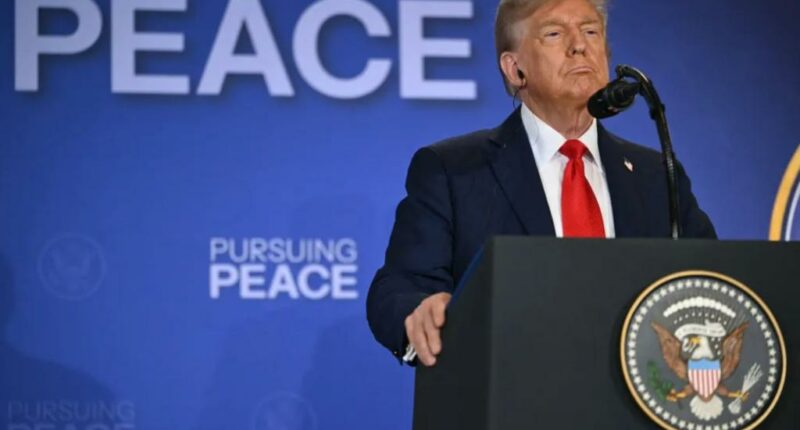Share this @internewscast.com
While not as tumultuous as the Jeffrey Epstein document saga, a quieter yet significant debate is happening within Trump’s sphere regarding marijuana legalization and its degree of legality, The Post reports.
And according to my sources, Trump is in a compromising mood.
He appears to be moving closer to making a decision in the coming weeks to make weed something less criminal in the eyes of the federal government.
According to several MAGA supporters advocating for marijuana, Trump is poised to decide on at least changing marijuana’s classification to a Schedule III drug, which would categorize it similarly to semi-controlled substances like anabolic steroids.
Without diving too deeply into the complexities, marijuana advocates wish to have it reclassified so it’s not grouped with dangerous drugs like heroin. This has been an ongoing conversation since late April in these columns. Reclassifying marijuana would help the thriving industry gain better access to banking services, aligning with cultural shifts as most Americans view marijuana as no more hazardous than alcohol. This change could also boost tax revenue as the industry grows.

However, there is resistance. Some MAGA supporters argue that marijuana contributes to cultural decline, concerned that today’s stronger strains are creating issues that weren’t present in the past.
Despite avoiding alcohol and disliking anything that numbs the senses, Trump’s position remains rooted in law and order, as demonstrated by his focus on quality-of-life issues in DC, such as the omnipresent smell of marijuana.
Nevertheless, the president appears open to a compromise regarding federal legalization, potentially allowing for medical use backed by proof of effectiveness in relieving severe pain.
He’s also said to be compelled by the business and the political argument of going soft on pot. He’s done that before, doing his famous 180 on crypto for votes during the 2024 election and delivering with deregulation that is propelling the blockchain industry.
There are an estimated 17 million-plus Americans who use pot regularly, and Trump understands math. The pot lobby could help in key races as the midterms approach.
MAGA loyalist Matt Gaetz, the former Florida congressman and Trump’s initial pick for attorney general, is one who believes embracing pot would further expand Trump’s base among working-class people of all races, where pot u sage is most prevalent.
“President Trump would cement [these voters] for Republicans for 25 years by ‘rescheduling’ marijuana,” Gaetz said. “Obama always wanted to do it but didn’t have the balls.” Gaetz added that Biden with his “autopen presidency” was too busy destroying the country to care. “This is yet another opportunity for Trump to notch a generational win where Ob- ama and Joe Biden failed.”
Longtime hedge fund trader Marc Cohodes is even more adamant about legalizing marijuana. He is both an investor in Pot Inc. and a medical user after shoulder surgery.
“If he totally legalizes, Trump will totally destroy the Democratic Party,” Cohodes tells me. “Polls show that most Americans want this legalized. Trump will turn the GOP into the people’s party.”
Trump’s options include totally “declassifying” pot, making it 100% legal in the eyes of federal law. He could also “reschedule” pot as a “Schedule III” controlled substance, along the lines of anabolic steroids
and other drugs that the feds have modestly blessed for specific medical-related uses.
If he does nothing, pot would r emain a Schedule I drug, where the federal government views it as a highly controlled substance.
Up to $60 billion annually
The various distinctions matter for the pot industry, which is estimated to rake in between $40 billion and $60 billion a year. While marijuana is fully legal or decriminalized in most states, without the federal government taking it off the Schedule I list it can’t be “banked.”
Wall Street shies away from underwriting the stock of any company that in Pot Inc. parlance “touches the plant.” If Wall Street can begin underwriting pot stocks, financing US-based growers, for example, Pot Inc. could grow exponentially.
Still, legalization skeptics on Trump’s team will have a say. New Drug Enforcement Administration chief Terry Cole is a veteran at an agency with a long anti-pot bias.
Robert F. Kennedy Jr., the head of the Department of Health and H uman Services, has spoken about decriminalizing weed but also how there are negative health effects from consuming the “high-potency” stuff.
Many critics say today’s bud has hallucinogenic effects, and could be a gateway to more dangerous stuff like opioids.
That’s why Gaetz thinks Trump won’t go for full legalization and allow it only for medical use. Ditto for longtime Trump political guru Roger Stone. “I don’t think he ever completely de-schedules it, which is what I would do,” Stone tells me.
Cohodes says not going all the way would be a mistake.
First, banking for Pot Inc. would remain difficult if it is only re- scheduled. Plus, making it totally legal could help decimate a major source of income for the various drug cartels. It would be age-restricted by the government.
“By eliminating prohibition, illegal cartels get removed because legal businesses not currently banked become bankable,” Cohodes said.

















